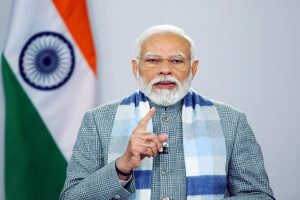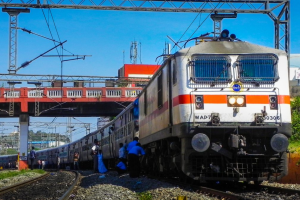Early January this year when India’s top industrialist Gautam Adani completed the purchase of Haifa Port in Israel, he was Asia’s richest and most admirable businessman. But then a sudden shark attack by a US-based shortseller Hindenburg Research Group left Adani bleeding.
The short-seller wrapping itself in the garb of researchbased corporate activism made billions for itself. That’s what short sellers do. They wager that “the stock they are short selling will drop in price. If the stock does drop after the short sale, the short seller buys it back at a lower price and returns it to the lender. The difference between the sell price and the buy price is the short seller’s profit,” according to Investopedia.
Advertisement
And then Hindenburg jumped to a most outrageous conclusion ~ a conclusion more political than financial: “India’s future is being held back by the Adani Group, which has draped itself in the Indian flag while systematically looting the nation.” Under US law, this accusatory statement may amount to “Actual Malice” or reckless disregard of the truth or falsity of the information.
There’s no evidence that the Adani Group has retarded India’s economic growth or robbed the country. Or the port-to-cement global conglomerate has pulled “The Largest Con In Corporate History.”
Research groups and accounting firms are not news media companies, and they are not protected by the First Amendment. Immediately following the attack, because of the global media echo-chamber effect, the Adani Group lost billions and so did Gautam Adani himself. But it wasn’t a bubble bust. The Adani Group’s setback had no significant effect on the $3.2 trillion Indian stock market, one of the five most vibrant stock markets in the world. Nor did global investors lose faith in India.
The worldwide conglomerate’s operations, which employ more than 23,000 people, stand on a solid foundation and include port management, electric power, mining, renewable energy, airport operations, oil and gas, food processing, and infrastructure. The Indian government did not buy into the myth that the Adani Group was too big to fail; and let it struggle on its own. Financial institutions stood by the Adani Group.
But Hindenburg by short-selling the Adani Group profited by “triggering the Indian giant’s price plunge,” according to Mark Humphery-Jenner, Associate Professor of Finance, UNSW Sydney, Australia. Investor Mark Mobius in an exchange with Business Today, went further and said, “My feeling is that probably the whole thing about Adani was overblown by the Hindenburg Group. They have their reasons for if you’re shorting stock, you want all the bad hints to come out. But I don’t think the reports by Hindenburg were completely accurate and on target.” Apart from vehemently rejecting the allegations, the Adani Group promptly rationalized, reorganised, and restructured its operations, and has begun to rise again.
However, keeping in mind the news media’s intense focus on the group, it needs to rebuild its international reputation, which can be done with the tools of modern corporate diplomacy.
Today, all major global corporations have competent corporate diplomats who keep in mind that one of the most important corporate challenges of today is to make companies not only financially successful, keeping the shareholders’ value in mind; but also make them behave as socially responsible corporate citizens. A failed company can be a social disaster regardless of the fact whether it is a socially responsible corporate citizen or not. At the same time, a financially successful company may not be able to sustain its competitive position in the global marketplace without building and sustaining its reputation as a good corporate citizen. To build a broad base of support for its activities and to maintain its brand and social reputation, a global company such as the Adani Group must do bridgebuilding diplomacy. The first step in doing corporate bridge-building is to ask the question: Who are we? The answer will embody the mission, the reason for being there, apart from creating wealth and prosperity which is the foundation of capitalism.
To answer the above question operationally, the following points should be kept in mind: * There is always scope for incorporating socially responsible behaviour into the business strategy of a company without hurting its financial success. * An open trusted relationship between a company and its various stakeholders would create better chances of weathering a crisis when it occurs. * Companies that live primarily on their brand reputation must live up to public expectations. * For global companies, establishing an early awareness system is indispensable not only for scanning emerging trends and troubles but also for exploring newer opportunities that may be arising.
This is what the Adani Group should have done and needs to do urgently. * A company that is perceived as a socially responsible good corporate citizen attracts talented people whose presence adds value to the company. * In the age of social media, companies are under constant global scrutiny by NGOs and other civic society and corporate activists such as the Hindenburg Group. * The news media is on the prowl for “bad news” because bad news makes good stories. Consider this: The Financial Times, Economist, The Wall Street Journal, The New York Times, and other financial newspapers, instead of doing their own research, simply began to parrot Hindenburg’s accusations. If the Adani Group was indulging in “brazen stock manipulation and accounting fraud scheme over the course of decades,” how is it that these mighty and powerful media outlets did not know?
This is an example of lazy journalism; or echo-chamber journalism. The first task of a corporate diplomat is to change the mindset of the top leadership about how, in the long run, social responsibility and sustainability policy can contribute to the company’s financial strength. The inward-looking performance-oriented corporate culture of a company must be changed to factor in the impact of its performance on the external environment.
The mission must embrace the entire supply chain, including customers and suppliers. Distrust should not linger anywhere along the supply chain. By building and widely disseminating the mission internally and along the entire supply chain, the corporate bridge-builder and diplomat would know where the resistance lies and how to change attitudes and build alliances. A good corporate value statement not only integrates the core business of a company into its social responsibility as a good corporate citizen but also dresses the entire package as the mission of the company.
The mission statement that also embodies a company’s business case must make the company’s presence a social necessity, an essential part of doing the public good. When a company focuses its attention exclusively on the marketplace, it might not pay much heed to the non-market environment in which it is embedded, and consequently, it might unwittingly ignore whatever dormant problems its early warning surveillance system captures. The cost of neglect could be very high, as the Adani Group has realized.
The top management was obsessed with the company’s market share value and its leaders learned the hard way. Being heard when the noise is loud is difficult. In the age of information overload, it is difficult to capture media attention. It is important for a corporate bridge-builder diplomat to have a media strategy, for example, on how to deal with negative news, and which groups to focus on when responding to bad news.
The Adani Group was not ready for bad news, regardless of its authenticity. The public is rather distrustful of the corporate world today. Many companies spin tales to cover their tracks, though most of the information about them is already available on the Internet.
Trust can be built through reasonable transparency, even though a company might never be able to please all its critics. A corporate bridge-builder diplomat should know how much transparency is strategically necessary without compromising the company’s integrity and endangering its trade secrets. For the Adani Group to rise and shine and compete as a global company, it must redefine its mission statement that should answer: Who are we? What are we doing and why?
(The writer, who is the author of INDIA IN A NEW KEY: NEHRU TO MODI, is affiliated with the Diplomacy and International Program at the Norwich University Graduate College. He publishes the Freedom & Geopolitics newsletter and podcast)











